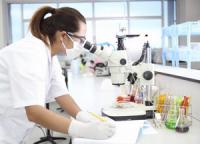-
NSF-funded research continues to support national security
The National Science Foundation (NSF) is usually associated with supporting scientists who go on to win Nobel Prizes, leading exploration of the planet’s polar regions, and enabling discoveries about the universe, from the subatomic world to distant galaxies. But the foundation also has ties to national defense that go back to its beginnings, as a product of the U.S. government working to enhance security during and after the Second World War. The National Science Foundation Act of 1950 called for the creation of an agency to “promote the progress of science; to advance the national health, prosperity, and welfare; and to secure the national defense.” NSF’s founder, Vannevar Bush, said: “It has become clear beyond all doubt that scientific research is absolutely essential to national security.”
-
-
Up to $600 billion in American intellectual property stolen annually

The theft of American intellectual property (IP) remains a systemic threat to the U.S. economy, inflicting an estimated cost that exceeds $225 billion in counterfeit goods, pirated software, and theft of trade secrets and could be as high as $600 billion annually. China remains the world’s principal IP infringer, driven by an industrial policy that continues to prioritize both acquisition and development of science and technology.
-
-
How science should respond to fake news
The rise of fake news has dominated the world of politics since the last U.S. election cycle. But fake news is not at all new in the world of science. “Fake news about science has always existed,” says one expert. “What has changed now is social media and the potential to disseminate this kind of news much faster among social networks.”
-
-
Concerns about science are unprecedented: AAAS president, CEO

Researchers are concerned at unprecedented levels about how a new presidential administration may undermine scientific work and delay its benefits, AAAS President Barbara Schaal and AAAS CEO Rush Holt said at a press event at the AAAS Annual Meeting. “It used to be when someone would say they were concerned about the state of science, they were talking about funding for research … these concerns about funding are not the ones being brought to me,” said Holt. “What I hear now are concerns about what I would call an ongoing trend that goes back many years, even decades, where ideology and ideological assertions have been crowding out evidence in public and private debates and policymaking.”
-
-
First Israeli nanosatellite launched
“BGUSAT,” the first nanosatellite for Israeli academic research, was launched Wednesday, 15 February as part of a collaboration between Ben-Gurion University of the Negev (BGU), Israel Aerospace Industries (IAI), and the Israel Ministry of Science, Technology and Space. It will provide researchers with data on climate change, agricultural developments, and other scientific phenomena. The nanosatellite is slightly larger than a milk carton (4x4x12 inches) and weighs only eleven pounds.
-
-
Center for Long-Term Cybersecurity unveils 2017 research grantees
The Center for Long-Term Cybersecurity (CLTC) has announce the recipients of its 2017 research grants. In total, twenty-seven different groups of researchers will share a total of nearly $1 million in funding. CLTC says that the projects span a wide range of topics related to cybersecurity, including new methods for making crypto-currencies more secure; protecting health information stored on mobile devices; teaching high-school computer science students how to “program for privacy”; and exploring potential limits on the use of digital controls in nuclear reactors.
-
-
Dual-use sciene, technological innovation
Scientific research can change our lives for the better, but it also presents risks – either through deliberate misuse or accident. Think about studying deadly pathogens; that’s how we can learn how to successfully ward them off, but it can be a safety issue too, as when CDC workers were exposed to anthrax in 2014 after an incomplete laboratory procedure left spores of the bacterium alive. Making decisions about the security implications of science and technology can be complicated. That’s why scientists and policymakers need clarity on the dual-use distinction to help consider our options.
-
-
Fortifying advanced manufacturing, save $100 billion annually by closing tech gaps
To spur significant innovation and growth in advanced manufacturing, as well as save over $100 billion annually, U.S. industry must rectify currently unmet needs for measurement science and “proof-of-concept” demonstrations of emerging technologies. This is the overall conclusion reached by economic studies of four advanced manufacturing areas used to create everything from automobile composites to zero-noise headsets.
-
-
S&T selects RAND Corp. to operate new DHS research center

DHS has selected the RAND Corporation to operate the Homeland Security Operational Analysis Center (HSOAC), which will conduct technical and operational research and analysis to aid the department. The new center is a federally funded research and development center, and is funded under a five-year contract worth as much as $494.7 million.
-
-
Sizable increase in U.S. R&D spending
U.S. research and development (R&D) performance rose to $477.7 billion in 2014 — an increase of $21.1 billion over the previous year — and is estimated to hit $499.3 billion in 2015. adjusted for inflation, growth in U.S. total R&D performance averaged 1.2 percent annually between 2008 and 2014, matching the average pace of U.S. gross domestic product (GDP).
-
-
Building a biosafety and biosecurity toolkit for a safer gene editing research
A new DARPA program could help unlock the potential of advanced gene editing technologies by developing a set of tools to address potential risks of this rapidly advancing field. The Safe Genes program envisions addressing key safety gaps by using those tools to restrict or reverse the propagation of engineered genetic constructs. Safe Genes was inspired in part by recent advances in the field of “gene drives,” which can alter the genetic character of a population of organisms by ensuring that certain edited genetic traits are passed down to almost every individual in subsequent generations.
-
-
Growing concern about amateur “biohackers” creating biological weapons
American and European security agencies have been increasingly focusing on the risk that “biohackers” – scientists who use genome-editing techniques to change life forms by increasing or decreasing the function of genes — could develop biological weapons or other dangerous biological substances. The problem is not only – or even mostly – with the work of professional scientists. Rather, the real danger lies with amateur scientists around the world who have started to use gene-editing techniques after the tools became cheap and readily available.
-
-
Keeping pace with the fast-developing science of gene drives
The emerging science of gene drives is drawing attention for its potential to help with critical health issues such as mosquito-borne diseases and environmental concerns such as agricultural pests and invasive species. At its most basic, a gene drive operates outside the traditional realm of genetics, in which an offspring has a 50-50 chance of inheriting a trait from one of its parents. A gene drive introduces a trait that will spread — or drive — through a population. “The science of gene drives is moving very fast,” says an expert. “[O]ur ability to assess the risks of gene drives, to oversee them with regulatory agencies, and to have a public discussion around gene drives is falling behind the science — We don’t want to wait until we have the technology in front of us to have discussions about regulation, oversight, ethics, and engagement.”
-
-
New Prize in Food and Agriculture Sciences announced
The National Academy of Sciences announced the creation of a new prize, the NAS Prize in Food and Agriculture Sciences, to be presented annually beginning in 2017 with an award of $100,000. The NAS Prize in Food and Agriculture Sciences will recognize research by a mid-career scientist at a U.S. institution who has made an extraordinary contribution to agriculture or to the understanding of the biology of a species fundamentally important to agriculture or food production.
-
-
Three ways synthetic biology could annihilate Zika and other mosquito-borne diseases
There are tried and tested approaches in the arsenal of weapons against the mosquito-borne disease, but to combat Zika and other mosquito-borne disease, more is needed. Gene drives, synthetic biology-based genetic engineering techniques, offer one solution by reengineering mosquitoes or obliterating them altogether. Yet we still have only the vaguest ideas of how the systems we’re hacking by using gene drives actually work. It’s as if we’ve been given free rein to play with life’s operating system code, but unlike computers, we don’t have the luxury of rebooting when things go wrong. As enthusiasm grows over the use of synthetic biology to combat diseases like Zika, greater efforts are needed to understand what could go wrong, who and what might potentially be affected, and how errors will be corrected.
-
More headlines
The long view
Smaller Nuclear Reactors Spark Renewed Interest in a Once-Shunned Energy Source
In the past two years, half the states have taken action to promote nuclear power, from creating nuclear task forces to integrating nuclear into long-term energy plans.
